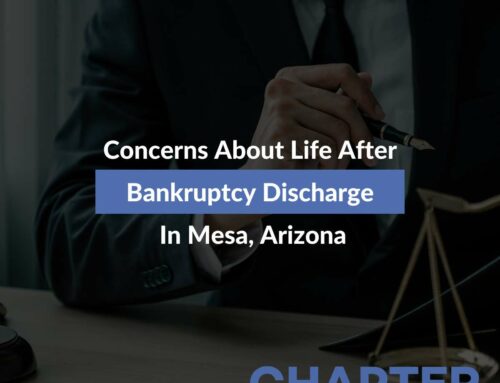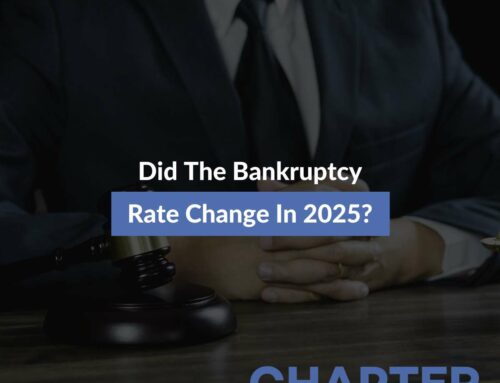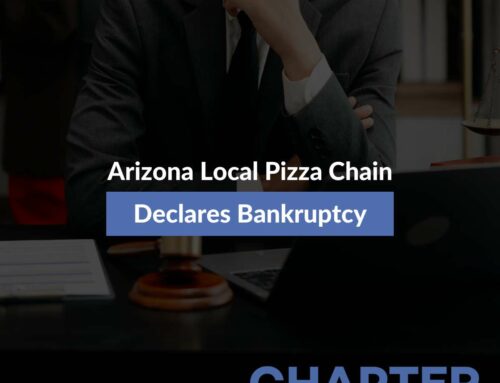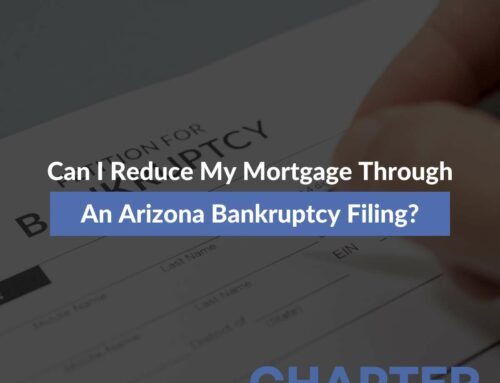Financial problems can cause stress and resentment between two spouses that could eventually lead to divorce. Debt and other financial issues are among the leading causes of divorce in the United States. It isn’t uncommon for a married couple to come to our firm unsure of whether they need to prioritize filing for bankruptcy or for divorce. In some scenarios, it is more advantageous for the spouses to file while still married, while others may benefit from filing separately either before or after divorce. You may also be wondering what happens if you file for divorce while in a joint bankruptcy case with your spouse that is still pending. Read on to learn more about how divorce issues can impact chapter 7 and chapter 13 bankruptcy filings in Phoenix, Arizona. To schedule your free consultation with an experienced bankruptcy professional with knowledge about how divorce issues interplay with bankruptcy, call 480-405-1010.

Listing a Former Spouse on a Bankruptcy Petition
If you are divorced or legally separated from your spouse, you probably want as little to do with them as possible. Unfortunately, there are special considerations for filing bankruptcy if you are recently divorced or legally separated. They may or may not require contact with your ex to complete your case.
When declaring bankruptcy, the court will look to not just your current individual income but your household income from the past 6 months. If you are recently divorced or separated, your ex’s income might still count towards your household income, which could affect your eligibility for chapter 7 bankruptcy or how much your monthly payments would be in a chapter 13 bankruptcy. The trustee may want to see proof of your ex’s income if you file for bankruptcy immediately after divorce or legal separation. This can be an awkward thing to request, but you may already have them available due to the divorce proceedings. On the other hand, your ex may not be employed, making this a non-issue. Either way, if you are filing for bankruptcy shortly after completing a divorce or legal separation, you should check with a bankruptcy attorney to see how it might affect your income level for eligibility purposes.
Marriage and divorce have a huge impact on a person’s financial situation. Additionally, a spouse could be ordered to pay child support and/or spousal maintenance. Debts need to be split in property division just like assets, so court orders can specify which spouse is liable for which debts. A trustee will want to see these documents to confirm that the information listed in the bankruptcy petition is correct. In Arizona, bankruptcy trustees require divorce or legal separation documents from six years prior. If you are considering filing for bankruptcy, start gathering these documents now so you aren’t rushed to do so at the last minute.
Chapter 13 Bankruptcy When Joint Debtor Spouses Divorce
Chapter 13 bankruptcy is a payment plan that pays off debts in four categories over the course of three or five years. While it is an effective form of debt relief, this is a relatively long commitment, and some couples who file for chapter 13 together inevitably get divorced during the process. One issue here is that the automatic stay freezes the debtor’s assets and lawsuits. Divorce is among the lawsuits that can’t proceed during a bankruptcy, as splitting assets and debts during property division and deciding the spouses’ financial situations going forward conflicts with the automatic stay. If the spouses are almost done with a chapter 13 bankruptcy case, this might only be a few months and not be a huge deal for them. But if the spouses just recently started their case, this will put a divorce in limbo, potentially for years. This is why most legal professionals will advise their married clients to avoid filing for chapter 13 bankruptcy if they are on the verge of divorce.
Another reason it can be inconvenient to file for divorce during bankruptcy is that it creates a conflict of interest for the bankruptcy attorney. Divorcing spouses have financial interests that are no longer in line with one another, so the bankruptcy attorney will no longer be able to represent both spouses. Chapter 13 cases are nearly impossible to complete without an attorney’s representation, so filing for divorce during chapter 13 could end up being fatal to the bankruptcy case. If possible, you may want to consider declaring chapter 7 bankruptcy instead. Chapter 7 bankruptcy will last closer to 3 to 5 months rather than years, which is less disruptive to the divorce process. It can also be a great way to save on divorce attorney fees if the spouses are clearing community property debt that would’ve needed to be resolved during property division.
What Happens If an Ex-Spouse Files for Bankruptcy?
If you learn that your ex-spouse has filed for bankruptcy, you are probably wondering how this could affect you. One reason this could be highly relevant is if your spouse took on community property debts- or debts that were incurred during the marriage- during property division. Community property debts are considered to belong to both spouses equally, even if only one spouse listed their name on the account or was even aware of the expenditure. While the division of debts is binding for family law matters, creditors aren’t necessarily bound by court orders holding one spouse responsible for community property debt.
Let’s say one spouse purchases a vehicle for their use alone during the marriage, and still has a balance remaining on the loan when the couple gets divorced. That spouse is awarded the vehicle, but experiences financial struggles after the divorce and the vehicle gets repossessed. The auction proceeds are less than the balance of the loan, so the spouse is left with a repossession deficiency. Unable to pay off the deficiency, that spouse files for bankruptcy. The auto loan provider could come after the other spouse, who probably hasn’t even thought about the vehicle for years at that point, for payment.
This is just one of the most common examples of why it could be important if your ex-spouse declares bankruptcy. It is also a consideration if your spouse wants to keep a marital asset in exchange for paying off a community property debt during property division.
Need More Information About Bankruptcy & Divorce in Phoenix, Arizona? Contact Our Firm for Your Free Consultation.
Getting divorced and filing for bankruptcy are stressful and confusing legal matters separately, and even more so when combined. Being fully informed about how bankruptcy can impact divorce can help prevent you from making legal mistakes that cost you for years to come. Learn more about bankruptcy in Arizona and what will happen if you file for divorce before your bankruptcy is discharged with one of our experienced bankruptcy lawyers. Our office offers free consultations by phone so you can ask any questions you may have from the privacy and convenience of your own home. We offer competitive rates and payment plans starting at Zero Dollars Down for qualified clients. If you’re seeking high-quality bankruptcy representation in the Phoenix area, don’t hesitate to contact us at Chapter Bankruptcy Lawyers for your free consultation at 480-405-1010.
CHAPTER BANKRUPTCY LAWYERS
Email: [email protected]
Website: www.chapterbankruptcylaw.com
Mesa Office
3707 E Southern Ave
Mesa, AZ 85206
Office: 480-405-1010
Tempe Office
4500 S Lakeshore Dr #300
Tempe, AZ 85282
Office: 480-562-6145







